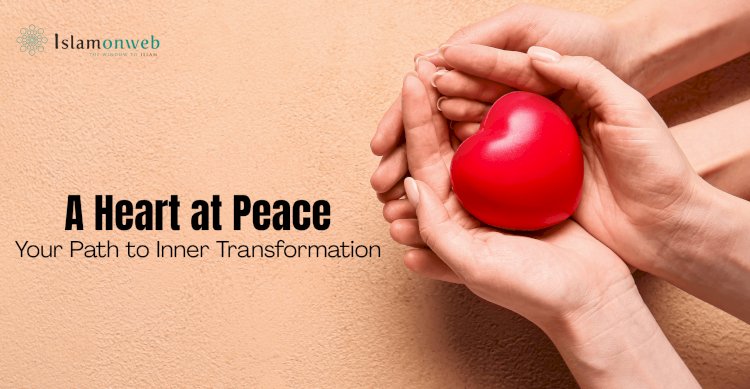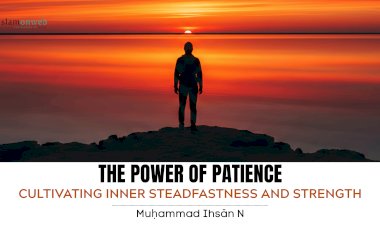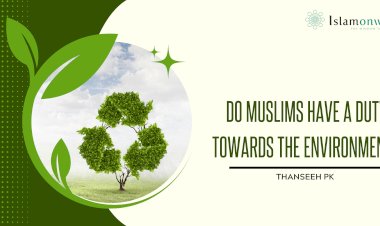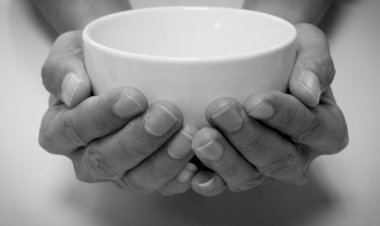A Heart at Peace: Your Path to Inner Transformation
Among the noble moral qualities that Islam nurtures is a trait that places a person at peace with himself and with others. It inspires him to wish good for people, to extend kindness and generosity, to uphold beneficence, and to hold back harm. Whoever adorns himself with this character tastes a life of tranquillity—loved by people and loved by the Lord of all people. It is one of the finest virtues and one of the most honourable qualities. This is Salāmat al-Ṣadr, the purity and soundness of the heart.
Salāmat al-Ṣadr refers to a heart that is pure—free from rancour, envy, and ill-feeling towards fellow Muslims.
It is the clarity of the heart, the gentleness of the soul, and the goodness of one’s inner state.
It is a heart filled with īmān and yaqīn, with taqwā, love, and mercy.
A ṣadr salīm or qalb salīm is a heart that carries no deceit, no resentment, no hatred, no envy, no spite, and no hostility towards any Muslim. Such hearts overflow with goodness and beneficence. Their possessors embody noble character; their inner state is marked by clarity, purity, and a sincere desire for the good of others. They are at peace within, and people remain safe around them.
As for the one with a corrupt heart and blameworthy character, people can expect harm from him, and he himself lives in turmoil.
By nature, a Muslim strives for a sound heart—pure in spirit, clean in intention—holding no malice toward his brothers and sisters. Instead, he loves them, wishes well for them, and desires good on their behalf. His outward conduct shines because his inner state is pure; for actions become wholesome only when the heart is wholesome.
Al-Fuḍayl ibn ʿIyāḍ رحمه الله said:
“In our view, one does not attain excellence through an abundance of voluntary prayers and fasting. Rather, excellence is attained through generosity of soul, purity of heart, and sincere counsel to the ummah.”
Among the immediate blessings granted to a servant in this life is that Allah grants him the gift of Salāmat al-Ṣadr towards everyone he lives with, interacts with, or even simply encounters. His heart is purer than his own garment. He believes that every Muslim has a right over him, while he demands no right for himself over others. Because of this, his life is wholesome and serene, and he loves good for others just as he loves it for himself.
The heart is the source of emotion, the wellspring of compassion, and the engine of character. It directs behaviour, shapes intentions, and determines the quality of one’s life. When the heart is sound, all actions and manners become sound. And when the heart is corrupted, all actions and manners become corrupted.
In Ṣaḥīḥ al-Bukhārī and Ṣaḥīḥ Muslim, al-Nuʿmān ibn Bashīr رضي الله عنه reported that the Prophet ﷺ said:
“Indeed, in the body there is a piece of flesh. When it is sound, the whole body is sound, and when it is corrupt, the whole body is corrupt. Indeed, it is the heart.”
And in Musnad Aḥmad, Anas ibn Mālik رضي الله عنه reported that the Messenger of Allah ﷺ said:
“The faith of a servant will not be upright until his heart is upright, and his heart will not be upright until his tongue is upright. And a man will not enter Paradise if his neighbour does not feel safe from his harm.”
Purity of Heart: A Mark of the Prophets and Messengers
Among the purest of people in heart, the most sincere in inner state, and the most sound in chest are the Prophets and Messengers of Allah. They desired goodness for their communities, striving with all they possessed to advise, guide, teach, and lead them to the truth.
About Prophet Ibrāhīm عليه السلام, Allah says:
“And indeed, among his followers was Abraham,
when he came to his Lord with a pure heart (qalb salīm).”
[al-Ṣāffāt 37:83–84]
As for our Prophet Muḥammad ﷺ, Allah blessed him with an expanded chest, a pure heart, and a sanctified soul. He says:
“Did we not expand your chest for you?
And relieve you of your burden
which weighed heavily upon your back,
and raise high your mention?”
[al-Sharḥ 94:1–4]
To embody Salāmat al-Ṣadr is to embody true following of the Prophet ﷺ, who had the soundest of hearts, the purest of souls, and the most transparent of inner states. His sīrah is filled with abundant such examples. He ﷺ endured harm in its most severe forms while delivering the message to all of humanity, yet when Allah granted him victory over those who had persecuted him, he did not seek revenge. His heart was free of rancour; he wished good for his ummah and disliked for them harm or affliction.
In Ṣaḥīḥ al-Bukhārī and Ṣaḥīḥ Muslim, ʿAbdullāh ibn Masʿūd رضي الله عنه said:
“It is as if I am looking at the Prophet ﷺ narrating the story of a prophet who was beaten by his people until they caused him to bleed. He wiped the blood from his face and said:
‘O Allah, forgive my people, for they do not know.’”
Purity of Heart Among the Righteous and God-Fearing
The Companions رضي الله عنهم embodied the finest examples of pure hearts and sound chests. They possessed the greatest share of this noble trait. They stood as one unified rank, each caring for the other, showing mercy to the other, and loving the other. Allah described them with these qualities when He said:
“And those who had settled in the city and embraced faith before them love those who emigrated to them; they find in their hearts no envy for what they have been given, and they give them preference over themselves even if they themselves are in need. And whoever is protected from the greed of his own soul—it is they who are the successful.”
[al-Ḥashr 59:9]
For the first generation, Salāmat al-Ṣadr was a measure of virtue and distinction. Iyās ibn Muʿāwiyah ibn Qurrah, describing the Companions, said about his father:
“The most virtuous of them, according to those who came before, were those with the soundest hearts and the least backbiting.”
Sufyān ibn Dīnār once asked Abū Bishr—one of the early righteous—“Tell me about the deeds of those before us.”
He replied, “They used to do little yet were given great reward.”
Sufyān asked, “Why is that?”
Abū Bishr answered, “Because of the purity of their hearts.”
Zayd ibn Aslam narrated that he once visited Ibn Abī Dujānah when he was ill, and found his face glowing with calmness. He asked him, “What makes your face shine like this?”
He replied:
“There are two deeds I trust most. One: I never spoke about what did not concern me. And two: my heart was always pure towards the Muslims.”
Ways to Develop a Qalb Salīm (Refined Version)
Whoever hopes to attain a sound chest and a pure heart must actively pursue the qualities that nurture Salāmat al-Ṣadr. These qualities are not accidental; they grow through intention, discipline, and nearness to Allah. Among the most essential means are the following:
- Anchoring the Heart in Allah Alone
A heart becomes pure when it depends on none but its Lord. He is the Turner of hearts and the One who directs all affairs. Whoever clings to Him finds their inner world stabilised and illuminated.
Purity of heart is inseparable from his obedience. Allah says:
“O you who believe, respond to Allah and to the Messenger when he calls you to that which gives you life. And know that Allah intervenes between a man and his heart, and that to Him you will be gathered.”
[al-Anfāl 8:24]
And He says:
“So whoever Allah wills to guide—He expands his chest to Islam. And whoever He wills to leave astray—He makes his chest tight and constricted as though he were climbing into the sky. Thus Allah places defilement upon those who do not believe.”
[al-Anʿām 6:125]
A heart that lives by Allah’s command is a heart that breathes serenity.
- Turning to Allah with Duʿāʾ and Humble Supplication
The believer frequently asks Allah to purify his inner state. Hearts soften through constant duʿāʾ. Allah Himself taught us this beautiful supplication:
“Our Lord, forgive us and our brothers who preceded us in faith, and do not place in our hearts any rancour toward those who believe. Our Lord, indeed You are Most Kind, Most Merciful.”
[al-Ḥashr 59:10]
A heart that frequently asks Allah for purity will not be left abandoned to its own rust.
- Keeping Close to the Qur’ān
The Qur’ān is the medicine for spiritual ailments. It polishes the heart and expands the chest. Allah says:
“O mankind, there has come to you an admonition from your Lord, and a healing for what is in the breasts, and guidance and mercy for the believers.”
[Yūnus 10:57]
The servant who recites, memorises, reflects, and lives by the Qur’ān continually renews the purity of his heart.
- Spreading Salām Among Muslims
Salām is not merely a greeting—it is a declaration of love, safety, and brotherhood. In Ṣaḥīḥ Muslim, the Prophet ﷺ said:
“You will not enter Paradise until you believe, and you will not believe until you love one another. Shall I not tell you something that, if you do it, you will love one another? Spread salām among yourselves.”
Hatred cannot take root in a heart that constantly sends peace to others sincerely.
- Showing Kindness to the Poor and Needy
Charity purifies the soul from greed, envy, and bitterness. Allah says:
“Take from their wealth a charity by which you purify them and cause them to grow.”
[al-Tawbah 9:103]
And He says:
“But the righteous one will be spared it—he who gives from his wealth to purify himself.”
[al-Layl 92:17–18]
- Reconciling Hearts and Repairing Relationships
Conflicts, when left unresolved, poison even the soundest of hearts. Allah commands:
“The believers are but brothers, so make peace between your brothers.”
[al-Ḥujurāt 49:10]
Broken hearts, like shattered glass, are not easily restored. A believer therefore hastens to mend rifts before they harden.
- Cultivating Good Thoughts About Others
A pure heart always searches for the best interpretation. Suspicion plants hatred and corrodes brotherhood. Allah says:
“O you who believe, avoid much suspicion. Indeed, some suspicion is sin.”
[al-Ḥujurāt 49:12]
And the Prophet ﷺ said:
“Beware of suspicion, for suspicion is the most false of speech. Do not spy, do not pry, do not outbid one another deceitfully, do not envy one another, do not hate one another, do not turn away from one another. Be, O servants of Allah, brothers.”
ʿUmar رضي الله عنه stated:
“Do not assume evil of a word spoken by your brother, while you can find a good interpretation for it.”
This principle alone can save friendships, families, and communities.
- Excusing Others and Overlooking Faults
A heart becomes light when it learns to forgive. Ibn Sīrīn رحمه الله said:
“If something reaches you about your brother, then find an excuse for him. And if you cannot find one, then say: ‘Perhaps he has an excuse I do not know.’”
A believer does not hunt for faults; he hunts for excuses. As the righteous said:
“The believer seeks excuses, while the hypocrite seeks faults.”
- Loving Good for others
Among the strongest signs of a sound heart is that a person sincerely wishes for others what he wishes for himself. In Ṣaḥīḥ al-Bukhārī and Ṣaḥīḥ Muslim, Anas رضي الله عنه reported that the Prophet صلى الله عليه وآله وسلم said:
“None of you truly believes until he loves for his brother what he loves for himself.”
A heart cannot be pure while it is filled with rancour, envy, arrogance, or self-admiration. These traits suffocate īmān and darken the inner state.
Al-Bayhaqī and al-Ṭabarānī narrate from Ibn Buraydah al-Aslamī that a man insulted ʿAbdullāh ibn ʿAbbās. Ibn ʿAbbās رضي الله عنهما replied:
“You insult me, while there are three qualities in me:
I come across a verse in the Book of Allah, and I wish all people knew from it what I know.
And I hear of a judge among the Muslims who judges with justice, so I am pleased—even though I may never take my case to him.
And I hear that rain has fallen upon a land of the Muslims, and I rejoice, even though I have no livestock grazing there.”
This is Salāmat al-Ṣadr in its finest form: a heart that celebrates the good of others even when it has no direct share in it.
- Contentment with Allah’s Decree in Provisions
A believer whose heart is anchored in certainty knows that provisions are written and distributed with divine wisdom. When this truth settles within, envy fades, and the heart becomes content with what Allah has allotted.
In Ṣaḥīḥ Muslim, Abū Hurayrah رضي الله عنه reported that the Prophet ﷺ said:
“Look at those who are below you, and do not look at those who are above you, for this is more likely to prevent you from belittling the blessings of Allah upon you.”
When a person constantly looks at those above him in worldly matters, he belittles the gifts already in his hands, and his heart grows resentful. But when he looks at those below him, gratitude awakens, humility grows, and he finds safety and serenity.
Allah says:
“And do not extend your eyes toward that by which We have given enjoyment to some of them—the splendour of the worldly life, by which We test them. And the provision of your Lord is better and more lasting.”
[Ṭā Hā 20:131]
A believer must struggle against the whispers that invite envy, for envy is among the most corrupting diseases of the heart and one of the quickest to darken the chest.
- Avoiding the Roots of Enmity
Another essential means of achieving a pure heart is avoiding the causes that breed hostility—anger, jealousy, gossip, slander, and fierce competition over worldly gains. These are spiritual diseases; Shayṭān plants them in hearts until they become filled with hatred and resentment.
Allah warns us of this trap:
“Shayṭān only wishes to cause between you enmity and hatred.”
[al-Māʾidah 5:91]
And He says:
“And tell My servants to say that which is best. Indeed, Shayṭān sows discord among them; indeed Shayṭān is to mankind a clear enemy.”
[al-Isrāʾ 17:53]
A believer protects his heart by guarding his tongue, calming his anger, avoiding gossip, and refusing to let worldly rivalry poison relationships. Every step taken away from the whispers of Shayṭān is a step closer to a qalb salīm.
The Path to Acceptance, Honour, and Salvation
A pure heart is not simply a virtue, it is a condition for the acceptance of deeds. In Ṣaḥīḥ Muslim, Abū Hurayrah رضي الله عنه reported that the Messenger of Allah ﷺ said:
“The gates of Paradise are opened on Mondays and Thursdays, and every servant who does not associate anything with Allah is forgiven—except a man between whom and his brother there is hatred. It is said: ‘Delay these two until they reconcile, delay these two until they reconcile, delay these two until they reconcile.’”
How much good a person loses when he allows resentment and hostility to settle in his heart.
A pure heart is also a mark of virtue and honour. In Sunan Ibn Mājah, ʿAbdullāh ibn ʿAmr رضي الله عنهما said that the Prophet ﷺ was asked, “Which people are best?” He replied:
“Every person with a clean heart and truthful tongue.”
They said, “We know the truthful tongue, but what is a clean heart?”
He said:
“One that is righteous and pure, with no sin, no aggression, no hatred, and no envy.”
A pure heart is also a path to Paradise and protection from the Fire. Allah says:
“And do not disgrace me on the Day they are resurrected;
the Day when neither wealth nor children will benefit—
except one who comes to Allah with a pure heart.”
[al-Shuʿarāʾ 26:87–89]
And in the famous incident narrated by Aḥmad and al-Nasāʾī, the Prophet ﷺ said three days in a row:
“A man from the people of Paradise will now enter.”
The same Anṣārī man appeared each time. ʿAbdullāh ibn ʿAmr later stayed with him to observe his worship, but found no exceptional deeds. When he finally asked what distinguished him, the man replied:
“Nothing except what you have seen—
except that I do not find in my heart any rancour toward any Muslim,
nor do I envy anyone for what Allah has given him.”
ʿAbdullāh ibn ʿAmr said:
“This is what raised you to that rank, and it is what we cannot easily do.”
O servants of Allah, tend to your hearts. Purify your inner states. Guard your intentions. Whoever rectifies his heart rectifies his deeds, and whoever purifies his inner self sees beauty in his outward actions. As the Prophet ﷺ said:
“Indeed, in the body there is a piece of flesh;
if it is sound, the whole body is sound,
and if it is corrupt, the whole body is corrupt.
Indeed, it is the heart.”
Disclaimer
The views expressed in this article are the author’s own and do not necessarily mirror Islamonweb’s editorial stance.
























Leave A Comment